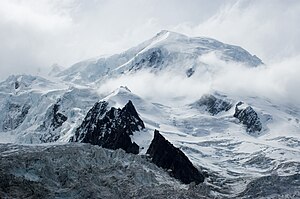
Back بوابة:الاتحاد الأوروبي Arabic Portal:Avropa İttifaqı Azerbaijani প্রবেশদ্বার:ইউরোপীয় ইউনিয়ন Bengali/Bangla Portal:Unió Europea Catalan Portál:Evropská unie Czech Portal:Den Europæiske Union Danish Portal:Europäische Union German Πύλη:Ευρωπαϊκή Ένωση Greek Portal:Unión Europea Spanish Teemasivu:Euroopan unioni Finnish
Introduction
The European Union (EU) is a supranational political and economic union of 27 member states that are located primarily in Europe. The Union has a total area of 4,233,255 km2 (1,634,469 sq mi) and an estimated total population of over 448 million. The EU has often been described as a sui generis political entity (without precedent or comparison) combining the characteristics of both a federation and a confederation. Containing 5.8% of the world population in 2020, EU member states generated a nominal gross domestic product (GDP) of around US$16.6 trillion in 2022, constituting approximately one sixth of global nominal GDP. Additionally, all EU states except Bulgaria have a very high Human Development Index according to the United Nations Development Programme. Its cornerstone, the Customs Union, paved the way to establishing an internal single market based on standardised legal framework and legislation that applies in all member states in those matters, and only those matters, where the states have agreed to act as one. EU policies aim to ensure the free movement of people, goods, services and capital within the internal market; enact legislation in justice and home affairs; and maintain common policies on trade, agriculture, fisheries and regional development. Passport controls have been abolished for travel within the Schengen Area. The eurozone is a group composed of the 20 EU member states that have fully implemented the economic and monetary union and use the euro currency. Through the Common Foreign and Security Policy, the union has developed a role in external relations and defence. It maintains permanent diplomatic missions throughout the world and represents itself at the United Nations, the World Trade Organization, the G7 and the G20. Due to its global influence, the European Union has been described by some scholars as an emerging superpower. In 2012, the EU was awarded the Nobel Peace Prize. The United Kingdom became the only member state to leave the EU, in 2020; ten countries are aspiring or negotiating to join it. (Full article...) Selected article Germany, officially the Federal Republic of Germany, is a country in Central Europe. It is bordered on the north by the North Sea, Denmark, and the Baltic Sea, on the east by Poland and the Czech Republic, on the south by Austria and Switzerland, and on the west by France, Luxembourg, Belgium and the Netherlands. Germany is a democratic parliamentary federal republic of 16 states. The country previously consisted of several sovereign states with their own history, culture, and religious affiliation. Germany was first unified as a nation-state amidst the Franco-Prussian War in 1871. The Federal Republic of Germany is a member state of the United Nations, NATO, the G8 and the G4 nations, and is a founding member of the European Union. It has the largest population and largest economy of all European Union member states. Germany is both the world's third largest economy and its largest exporter of goods. Germany is facing major demographic change. Its fertility rate of 1.39 children per mother is one of the lowest in the world, and the federal statistics office estimates the population will shrink to approximately 75 million by 2050. Chemnitz is thought to be the city with the lowest birth rate in the world. Selected picture
Photo credit: Nattfodd The top of Mont Blanc, the European Union's highest mountain, seen from the Gare des Glaciers.Did you know?...that "Nocturne" is the Eurovision Song Contest winner with the fewest words, the Norwegian language original having only 25?  ...that the Eastgate Clock (pictured) in Chester is the second most photographed timepiece in the United Kingdom, after Big Ben? ...that "Kinek mondjam el vétkeimet?" received three perfect scores at the start of voting in the Eurovision Song Contest 1994 before ultimately coming in fourth, making Hungary the only debuting nation to lead the voting? Selected cityParis is the capital city of France. Situated on the banks of the river Seine in north-central France, it is also the capital of the Île-de-France région, which encompasses Paris and its suburbs. The City of Paris had an estimated mid-2004 population of 2,144,700. The Paris urban area, extending well beyond the city boundaries, has today an estimated population of 9.9 million. The Paris metropolitan area (including satellite towns) stood at 11.5 million in 1999. It produces more than a quarter of France's wealth, with a GDP of €478.7 billion in 2005. With La Défense, one of the largest business districts in Europe, Paris also hosts the head offices of almost half of the major French companies. Paris is a leading global cultural, business and political centre and has a major international influence in fashion, gastronomy and the arts. It is widely regarded as one of the world's major global cities, with notably the headquarters of many international organisations such as UNESCO, the OECD, the ICC. General imagesThe following are images from various European Union-related articles on Wikipedia.
TopicsFeatured contentFeatured articles
Featured lists
Featured contentGood articles
CategoriesRelated portalsAssociated WikimediaThe following Wikimedia Foundation sister projects provide more on this subject:
Discover Wikipedia using portals |
© MMXXIII Rich X Search. We shall prevail. All rights reserved. Rich X Search






























































